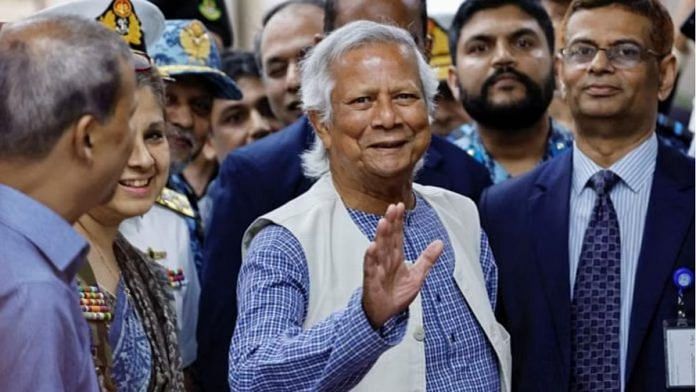
If you don’t like what is being said, then change the conversation. This famous line by Don Draper, the protagonist in American television series Mad Men, perfectly sums up Muhammad Yunus’ strategy in Dhaka in 2025. The interim government’s chief adviser refuses to give a clear answer to the one question on the minds of Bangladesh watchers: When will the next elections be held?
On 4 January, Yunus assured British parliamentarian Rupa Huq, part of a United Kingdom business delegation in Dhaka, that the next general election would be completely free and fair. He also gave two possible timelines for the polls: December 2025 or mid-2026. But Yunus had a rider. “The election date depends on how much reform people want.”
But these talks are just delay tactics, Bangladeshi journalist Sumi Khan told me. “This is an unconstitutional government that wants to stick on to power with the backing of the Jamaat and the student-advisers. Almost every political party in Bangladesh is getting impatient for the next national elections as also the people of the country. But Yunus is delaying the date by saying there should be reforms first.”
For those who want early polls in Bangladesh, a bigger question looms: Will Yunus try to change the constitution to delay polls indefinitely?
Sumi Khan fears a rerun of 9 June 1988 – when the Eighth Amendment Act was passed and Bangladesh’s struggle with secularism became more intense. “The act declared that Islam shall be Bangladesh’s state religion (Article 2A),” she said. The Act also decentralised the judiciary by setting up six permanent benches of the High Court Division outside Dhaka (Article 100). “Now, there is fear that the constitution may be amended to do away with man-made laws altogether, which is what the Jamaat wants,” she added.
Last August, soon after the fall of the Sheikh Hasina government, leaders of the Bangladesh Jamaat-e-Islami held a meeting with the country’s top Qawmi scholars. Here, participants openly discussed plans to establish a country based on Islamic rules under the leadership of the Jamaat chief. The organisation has, in the past, openly advocated for Sharia laws, asserting, according to The Daily Star, that no man-made laws would be allowed to be in force.
Khan’s fears almost came true on New Years’s eve when the convenors of the Anti-Discrimination Students’ Movement of Bangladesh announced that they would launch a ‘July proclamation’ to “bury” the 1972 constitution of Bangladesh.
“At 3 pm, 31 December, we will declare the proclamation of July revolution. This will be the announcement of Bangladesh’s next goals, dreams and intentions. The declaration of 31 December at the Shahid Minar will be a legal recognition of the July Revolution…the Mujib-badi constitution should be buried,” Hasnat Abdullah, convener of the Anti-discrimination Students Movement, had said.
“The 1972 constitution adopted under the leadership of Sheikh Mujibur Rahman has been amended on multiple occasions but the constitution has more or less survived all criticisms including the military rules of President Ziaur Rahman and General Hossein Mohammad Ershad,” The Hindu wrote after the announcement.
However, the 31 December event did not take place. “If the proclamation of July revolution happened, Bangladesh would officially have turned into a caliphate. There would have been no need to call for elections any longer,” said Khan.
Also read:Divide and rule, siding with radicals—Yunus has learned what will keep him in power
Journalist Sahidul Hasan Khokon stressed that one failed attempt doesn’t mean Muhammad Yunus or his backers, such as the Jamaat and the student-conveners, wouldn’t attempt to change the constitution. “Yunus swore on the constitution when he took over as the caretaker, but his government is anti-constitutional. There is no provision in the current constitution for an interim government. To stick on to power, he will have no other option but to change the constitution. How long will he keep delaying elections?”
Frustrated over Yunus’s delay in organising elections, one of the largest political parties in the country, the Bangladesh Nationalist Party (BNP), has taken potshots at the student leaders and advisers to the regime.
In an interview to Bangladeshi media outlet New Age last week, Yunus said Narendra Modi’s camaraderie with incoming American President Donald Trump, and the presence of a sizeable number of Indian-Americans in the Trump administration, may be a reason to worry for Bangladesh. With growing clamour for polls and evolving global dynamics, changing the constitution may be Yunus’ only option to retain power.
Deep Halder is an author and journalist. He tweets @deepscribble. Views are personal.
(Edited by Zoya Bhatti)